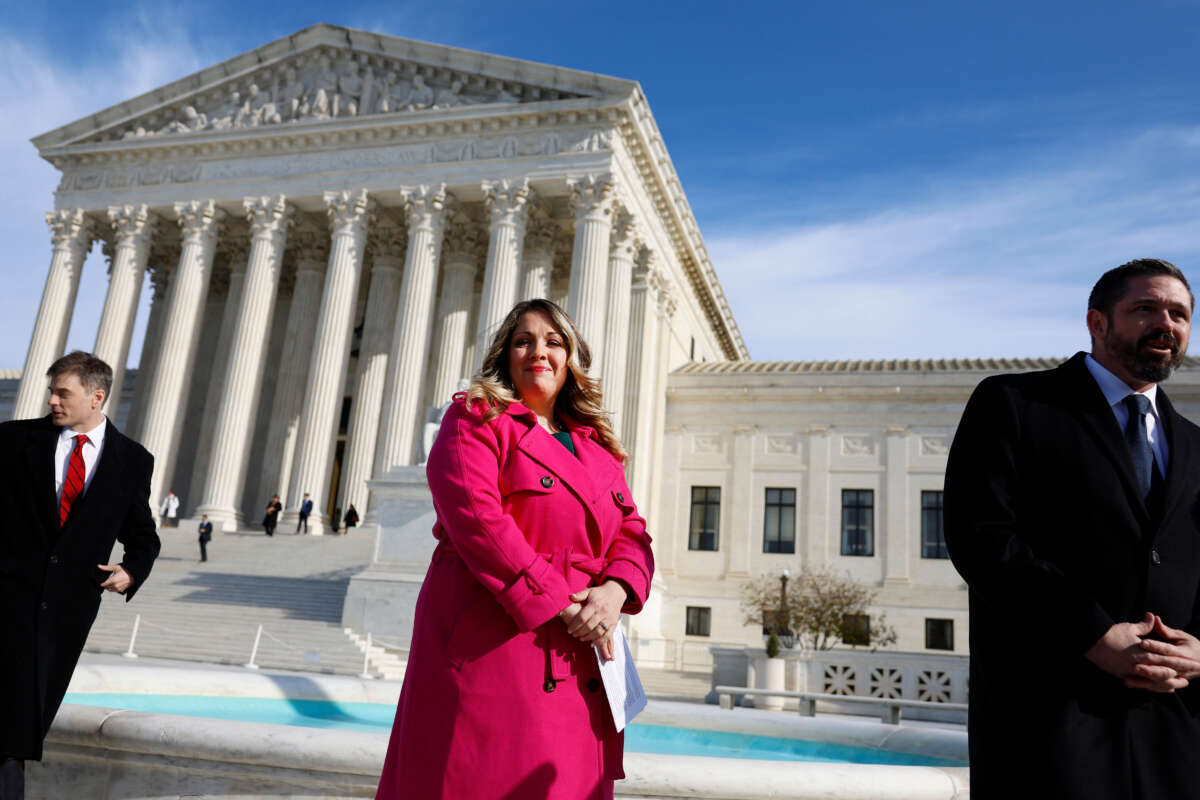A petitioner in the recent U.S. Supreme Court case that overturned anti-discrimination protections for LGBTQ people in Colorado appears to have misled the Court regarding key facts in the case.
Lorie Smith, who owns the website production company 303 Creative, was represented in the case by the far right legal organization Alliance Defending Freedom (ADF). In their filing to the Court, Smith and ADF claimed that a Colorado law barring businesses from discriminating against LGBTQ residents had rendered her unable to perform certain functions within her business, particularly creating wedding websites, as she didn’t want to make websites for same-sex couples.
But reporting from The New Republic shows that Smith did create a wedding site in at least one instance.
Columbia University legal historian Kate Redburn discovered the evidence while doing research on right-wing disinformation and alerted The New Republic, which has been closely monitoring the case. Using the Wayback Machine, an internet archival service, Redburn found that Smith had produced a wedding site in 2015, and had included it as an example of the kind of work she could provide to potential clients on her own website.
Redburn said they were taken aback by the finding. “The idea that she hadn’t made any wedding websites for anyone was so baked into the narrative around this case,” Redburn said.
After being confronted with the evidence, ADF admitted that Smith had made the site for a family member and had removed it from her portfolio before the Supreme Court had heard the case, The New Republic reported. ADF denied that this changed aspects of Smith’s chilled speech claims.
After The New Republic reached out to ADF for comment, the organization wrote on its Twitter account that Smith didn’t “advertise or offer to create WEDDING WEBSITES for the general public.”
“Yet the wedding website appeared on a page advertising Smith’s web design services, for anyone, and was undifferentiated from what Smith says is her commercial work,” The New Republic’s Melissa Gira Grant reported. “Whether or not Smith charged the bride for her services, the wedding website was, apparently for much of 2015, being used to advertise her services. A reasonable conclusion to draw is that designing wedding websites is one of them.”
This isn’t the first time Smith and ADF have been caught lying in their complaint to the Court.
Prior to the Supreme Court’s ruling in late June, The New Republic discovered that Smith had used the name of a man in her legal filing, alleging that he and his partner had requested a wedding website, purportedly showcasing the real possibility that, had she offered wedding websites, same-sex couples would have requested her services.
In fact, Smith and ADF appear to have made the whole thing up. The man, who went by the name Stewart in the filing, does exist, but he has been married to a woman for several years, and is himself a website creator, a point that makes his supposed request for a website dubious at best.
“I’m married, I have a child — I’m not really sure where that came from? But somebody’s using false information in a Supreme Court filing document,” Stewart told The New Republic.
In spite of the false claims made in the case, the conservative majority in the Supreme Court sided with Smith, ruling that the Colorado anti-discrimination law was too burdensome for businesses and violated their speech rights. “The First Amendment envisions the United States as a rich and complex place where all persons are free to think and speak as they wish, not as the government demands,” Justice Neil Gorsuch wrote in the Court’s majority opinion.
Justice Sonia Sotomayor dissented to the ruling, writing:
Five years ago, this Court recognized the ‘general rule’ that religious and philosophical objections to gay marriage ‘do not allow business owners…[to] deny protected persons equal access to goods and services under a neutral and generally applicable public accommodations law. Today, the Court, for the first time in its history, grants a business open to the public a constitutional right to refuse to serve members of a protected class.
Chase Strangio, a lawyer and transgender activist, has said that the ruling will have detrimental effects on LGBTQ people going forward.
“So many people already hold the anxiety of being turned away. From stores. From hotels. From hospitals. It becomes ingrained and shapes the contours of life,” Strangio said. “Validating it reinforces the most insidious forces at play in the supremacies that have defined this country.”
Media that fights fascism
Truthout is funded almost entirely by readers — that’s why we can speak truth to power and cut against the mainstream narrative. But independent journalists at Truthout face mounting political repression under Trump.
We rely on your support to survive McCarthyist censorship. Please make a tax-deductible one-time or monthly donation.
